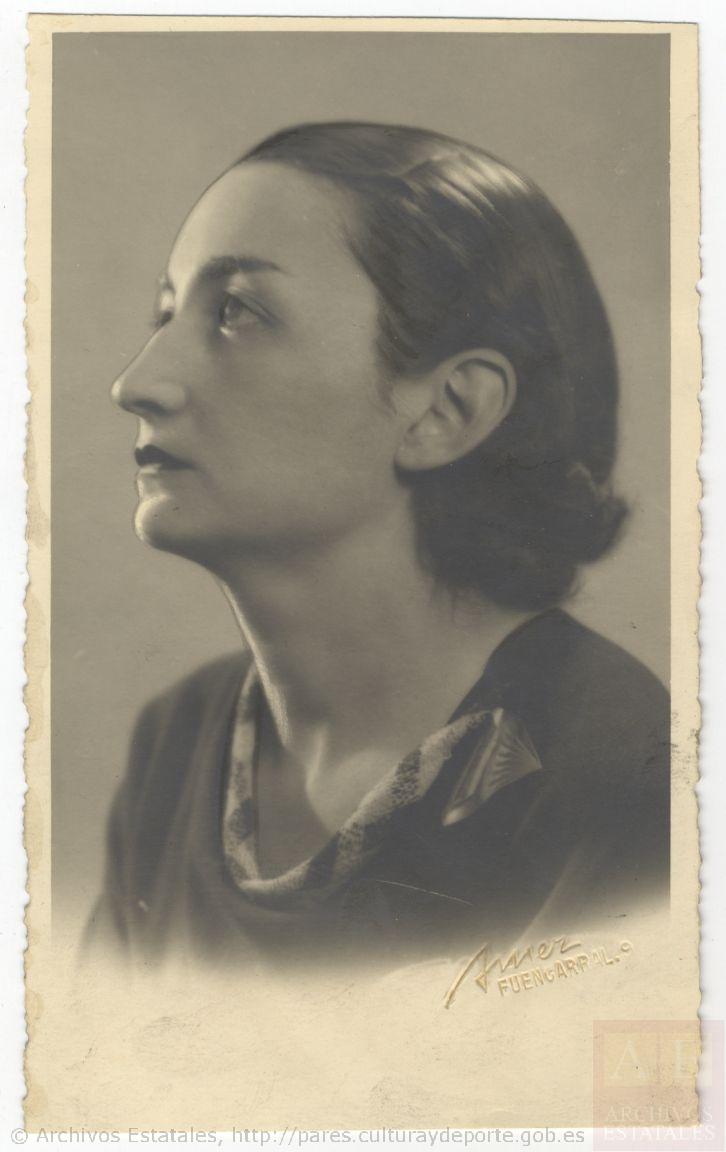 Persona - Champourcin, Ernestina de (1905-1999)
Persona - Champourcin, Ernestina de (1905-1999)
Identificación
Tipo:
Persona
Forma autorizada:
Champourcin, Ernestina de (1905-1999)Otras formas
Fechas de existencia:
Vitoria-Gasteiz (Álava, España) 1905-07-10 - Madrid (España) 1999-03-27
Historia:
Escritora y poetisa española, perteneciente a la Generación del 27, exiliada en México tras la Guerra Civil.
Hija del abogado de origen francés y diputado por Madrid, Antonio Michels de Champourcin Tafanell, I barón de Champourcin y de Ernestina Morán de Loredo Castellano, natural de Montevideo; hermana de Jaime, Adolfina (Fifí) y María Luisa (Lulú) Michels de Champourcin.
La familia se trasladó a vivir a Madrid y Ernestina tomó allí sus primeras letras con profesores particulares, para luego estudiar en el colegio Sagrado Corazón. Obtuvo el título de bachiller en el Instituto Cardenal Cisneros de Madrid.
Comenzó a escribir poesía muy joven, influida por escritores modernistas, como Rubén Darío y Juan Ramón Jiménez, su maestro. Tomó contacto con la Generación del 27, a través de la Residencia de Estudiantes, donde acudía a conferencias, con compañeras como Concha Méndez. Se relacionó con poetas, como Rafael Alberti.
Cuando estalló la Guerra Civil, su familia se refugió en una embajada, pues eran monárquicos y no habían simpatizado con el régimen republicano. Ella se quedó en su casa y sintiendo la necesidad de ayudar se presentó voluntaria como enfermera en el hospital de sangre instalado en el Instituto Oftálmico de Madrid, que dirigía el médico oftalmólogo Manuel Rivas Cherif, y en el que también trabajaron como voluntarias sus hermanas Dolores y Adelaida Rivas Cherif.
Se casó con el también poeta Juan José Domenchina el 6 de noviembre de 1936. Había escrito para revistas como La Gaceta Literaria y Manantial y durante la Guerra, en La Hora de España. No participó en ninguna organización política; su marido, en cambio, formó parte de Izquierda Republicana. Se marcharon a Valencia, cuando se trasladó allí el Gobierno de la República, ya que su marido era el director del Boletín de Información del Ministerio de Propaganda y ella participaba como traductora; más tarde, a Barcelona hasta que el Presidente Azaña salió de España rumbo al exilio. Ella y su familia cruzaron también a Francia y se alojaron en una casa que el mismo Presidente Azaña les ofreció junto a otros exiliados. Consiguieron pasaporte diplomático para toda la familia, evitando así el ingreso en un campo de concentración francés, y se dirigieron a Toulouse. Allí pasaron tres meses, hasta que su marido obtuvo una invitación de la Casa de España en México.
Viajaron a México en el buque Flandre, llegando al puerto de Veracruz el 15 de junio del 1939. Unas semanas después, se trasladaron a México D.F.
Su marido fue contratado por la Casa de España y ella comenzó a trabajar como traductora para la editorial UTEHA y más tarde para el Fondo de Cultura Español (FCE). También colaboró en revistas literarias y femeninas como Romance y Rueca.
Había recibido formación religiosa católica, pues su familia era practicante, y no abandonó esta práctica durante la Guerra Civil, a pesar de las dificultades. No obstante, si sufrió una crisis religiosa y en México se acercó al grupo católico religioso Opus Dei. Su esposo Juan José Domenchina falleció en 1959. Ella regresó a España en 1972, falleciendo en la capital española en 1999.
Descripción: Expedición que sale de Francia y llega a Veracruz en junio de 1939
Fecha del evento: 1939-06-15
Lugar asociado a la fecha:
Fecha del evento: 1936 - 1939
Contexto:
El archivo personal de Ernestina Champourcin se custodia en el Archivo General de la Universidad de Navarra.
Ocupaciones
actividad:
Profesión (Es realizada por):
Profesión (Es realizada por):
Lugares
Lugar de Partida:
Lugar de Residencia:
Lugar de Residencia:
Lugar de Nacimiento:
Lugar de Defunción:
Conceptos/Objetos/Acontecimientos
Fuentes
Balló, Tània. Las sinsombrero: sin ellas, la historia no está completa. Barcelona: Espasa. 2016. 301 páginas. ISBN: 978-84-670-4603-8.
Champourcin, Ernestina de. Aub, Elena. Proyecto de Historia Oral "Refugiados Españoles en México", Archivo de la Palabra, Instituto Nacional de Antropología e Historia (INAH), México : entrevista a Ernestina de Champourcin. Realizada Por Elena Aub [Para El Instituto Nacional de Antropología E Historia de México En Colaboración Con el Ministerio de Cultura de España]. [s.L.: S.N.]: 1979]. 63 H..
Pla Brugat, Dolores. Catálogo del fondo de historia oral : refugiados españoles en México : Archivo de la Palabra. 1ª ed.. Dolores Pla Brugat (coordinadora). México D.F.: Instituto Nacional de Antropología e Historia. 2011. 1 CD-ROM. 978-607-484-184-8.
Relaciones
Relaciones asociativas :
Relaciones familiares :
Enlaces Externos
Biografía virtual:
Fondo documental:
Universidad de Navarra: Archivo General : Archivos personales
Catálogo de Autoridades:
Fichero de Autoridades:
Fichero de Autoridades:
Documentos
Productor de:
- No hay Unidades de Descripción asociadas.






